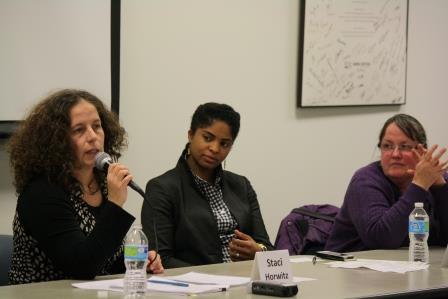On Thursday, December 4th, nearly 40 community members gathered at Goodwill Easter Seals for our second BCLI Issue Series of the season. Together we explored how to promote equitable community development without displacing residents and gentrifying neighborhoods in the Twin Cities.
Building on the first Issue Series around organizing and engagement, we discussed the following two questions: How do neighborhoods define what equitable change looks like? How do communities of color benefit from development and prevent gentrification and displacement?
We started the evening with small group discussions around the definitions of gentrification and displacement, then moved into our panel of neighborhood leaders who shared strategies and stories of successful neighborhood-led change that included authentic engagement and representative decision making. Check out the audio links below to listen to each panelist and view the photo gallery here.
Caty Royce, the Director of Frogtown Neighborhood Association, kicked off the panel talking about building relationships and having honest conversations about neighborhood change with new and long time residents. Ms. Royce also spoke to the value of the Frogtown neighborhood being locally controlled, which led to the development of the Frogtown Farm and a small development company designed to Preserve Frogtown and build on the historical blue collar history of the neighborhood.
Shauen Pearce, the Executive Director of Harrison Neighborhood Association, shared her strategies for engaging residents around policy, as well as ways to ensure that the board of HNA reflects the community and therefore leads decision-making around neighborhood developments.
Staci Horwitz, Program Director of the City of Lakes Community Land Trust (CLCLT), expanded on equitable neighborhood change from the perspective of ensuring affordable homeownership for residents, using a community land trust model in the neighborhoods slated for change and development.
The evening concluded with audience questions to the panel. Listen to the full Q & A, or see the list of questions below.
- (00:38) How do you inform and raise awareness around policy issues so they are more engaged and informed in the policies affecting their neighborhoods?
- (09:15) How is a land trust structured and can people get involved?
- (14:10) How can we allow and encourage affordable housing developments more in the inner core of the city versus on the outskirts like North Minneapolis (where there is ample affordable housing, “where we are affordable housed out”), without displacing those who already live there?

